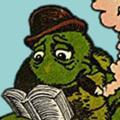anka.trini reviewed Hamnet by Maggie O'Farrell
3,5 Sterne
4 stars
I expected the novel to be more emotional. The prose made the characters feel detached from me as the reader. And it was a rather strange decision to never use Shakespeare's name. And I would have liked to get to know more about Shakespeare's depression and his stay at Bedlam asylum.
I expected the novel to be more emotional. The prose made the characters feel detached from me as the reader. And it was a rather strange decision to never use Shakespeare's name. And I would have liked to get to know more about Shakespeare's depression and his stay at Bedlam asylum.















